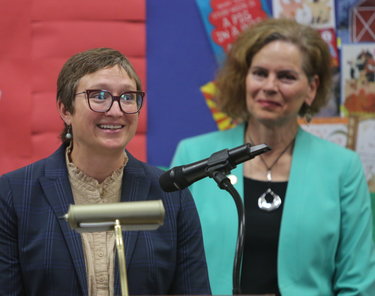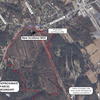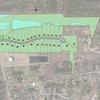VPL gets $72K from state for local history room
Enterprise file photo — Michael Koff
“New York State Construction Aid for Libraries is vital for us to adapt to meet the needs of our community,” said Sarah Clark, left, director of the Voorheesville Public Library at an event in 2022 celebrating $229,292 in state funds secured by Assemblywoman Patricia Fahy, at right.
VOORHEESVILLE — Local history will soon have a room of its own in the Voorheesville Public Library.
Assemblywoman Patricia Fahy this week announced over $300,000 in construction aid for libraries in her 109th District, including $72,280 for the Voorheesville library.
“We get offers of fascinating diaries and photos,” said the library’s director, Sarah Clark, but there is currently no way to make those items accessible to the public.
The village is undergoing a resurgence of interest in its history as a joint village and town Historic Preservation Commission this year released a survey by Hartgen Archeological Associates found three places in New Scotland that might, with work, be eligible for designation on the National Register of Historic Places.
One of those places is the Victorian village of Voorheesville.
“With new things coming,” said Clark, referencing the Business for Good projects in the center of the village — a café and a tavern, “people look backward to what was there before.”
The Hartgen survey noted the two demolished buildings and said the proposed Voorheesville district had 97 resources that would contribute.
She also noted that Smith’s Tavern is set to reopen and that the library has a collection of letters written by Lillian Smith, who, with her husband, Frank Smith Sr., owned Smitty’s and corresponded with hometown soldiers fighting in World War II.
Clark noted, too, that both Dennis Ulion and the village’s historian, Dennis Sullivan, have, through the library, offered walking tours of Voorheesville’s history.
“The tours have run for years,” she said, “and we haven’t saturated the market yet.”
With so much new development in town and so many new residents, Clark said, people are interested in learning about Voorheesville’s past.
Currently, many of the library’s historic items are not readily available to the public and some of them are not even indexed, said Clark. Much is in storage or not shelved in a way that is easy to find, she said.
The grant money will be used to turn the library’s mezzanine into a local history room.
Many library patrons don’t even realize there is a mezzanine, she said. It is located above the staff offices, she said, and had been used for storage of payroll records, toys, and miscellaneous things.
“We cleaned it out so we could organize it and invite the public to use it with the assistance of a librarian,” said Clark.
The grant will pay for high-density shelves. Clark explained the shelves run on tracks with big cranks on the side to “maximize floor space.”
A librarian knowledgeable about archives had said that the mezzanine was “too hot for fragile paper” so the grant will also pay for a ventilation and air-conditioning system that “will control climate in that space,” said Clark.
The library won’t start work on the local history room until it has completed projects currently underway, said Clark. Last year, Voorheesville received $229,292 in state funds through the same New York State Construction Aid for Libraries program.
“I’ve made it a practice to try every year,” said Clark of applying for the state funds. She has directed Voorheesville’s library since 2018. “What have we got to lose?” she asked.
The current projects include improving the library’s entryway, creating reading areas with natural light, and renovating the children’s area and circulation desk.
The library is expected to remain open throughout the construction work as adaptations are made — using the library’s side entrance, for example, when the front entrance is getting its new vestibule, for example.
Clark thanked Fahy “for always supporting construction aid for libraries.”
“More than half of the over 1,000 public library buildings in communities across New York are over 60 years old, and approximately one-third are more than three decades old,” said the release from Fahy’s office announcing the grants; the other grants are going to six branches of the Albany Public Library.
“Many of New York’s local public libraries are unable to accommodate users with disabilities, are energy inefficient, cannot provide Internet and computer and other electronic technologies to users because of outdated and inadequate electrical wiring,” Fahy’s announcement said. “Additionally, many do not have sufficient space to house the library’s expanding collection, address the need for adequate meeting room, or provide for public access computers.
The grants help make collections more accessible and sustainable, Clark said.
“It’s a lot of work,” Clark concluded. “I’m really excited to have this opportunity.”



